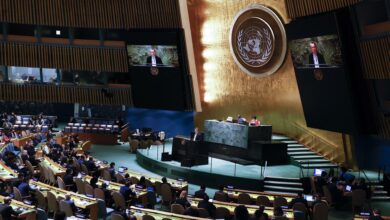Embattled Sri Lankan president Gotabaya Rajapaksa linked to war crimes

New Delhi, May 11 (EFE).- Even as Sri Lanka is battling a wave of violence after three months of protests triggered by a severe economic crisis, a report released on Wednesday by two nonprofits has criticized the role of President Gotabaya Rajapaksa during “brutal counter-insurgency operations” in the 1980s.
Rajapaksa, who launched a merciless military offensive that ended three decades of civil war in 2009 and has been repeatedly accused of backing brutality during the conflict, came to power in 2019 as a military hero, while promising an economic boom and better security from Islamist terror.
The president has so far resisted the protesters’ demand for his resignation, after his government was blamed for plunging the country into an economic crisis which has resulted in surging inflation and fuel and food shortages.
A joint document released by nonprofit International Truth and Justice Project and Journalists for Democracy in Sri Lanka has highlighted Rajapaksa’s alleged complicity in abuses during operations against insurgent group Janata Vimukti Peramuna – now a registered political party – in the 1980s.
“Gotabaya Rajapaksa knew, or should have known, that soldiers under his command were responsible for these widespread and systematic human rights violations,” the groups said.
Rajapaksa was the military coordinator for the central Matale district between 1989 and 1990, at a time when the area was a stronghold of the Marxist rebels of JBP, belonging to the majority Sinhalese community unlike the separatist Tamil Tigers of LTTE, the other major insurgent group in the country.
“It was a period of mass atrocity crimes, when headless corpses littered fields and heads were displayed on spikes by the wayside and on bridges,” the report said.
At least 700 people disappeared in the area under Rajapaksa’s control, according to the findings of a presidential commission, while a government investigation in the 1970s reported over 1,000 such complaints in Matale.
“In a considerable number of cases, complainants to the Commissions named Gotabaya Rajapaksa” as a key figure in the disappearances of their relatives, in a conflict which killed 40,000-60,000 people, the study stressed.
The district came into spotlight in November 2012, when a mass grave with 154 bodies was found near the site of a military camp between 1989-1990.
The report said that no genuine efforts were made by successive governments to ascertain the identity of the victims.
“Gotabaya Rajapaksa was fully aware of the circumstances in which the crimes were being perpetrated by the security forces under his command and failed to take the necessary and reasonable measures within his power to prevent the commission of such crimes,” it alleged.
The current president joined the Sri Lankan army in 1971 and participated in offensives such as Operation Freedom, launched to liberate the northern territory of Vadamarachchi from LTTE rebels in 1987.
After retiring and living abroad for several years, he returned to the country in 2005 and was made the defense secretary of Sri Lanka during the 10-year-long presidency of his brother Mahinda Rajapaksa.
Both the brothers have been accused of human rights violations, especially during the bloody offensive led by Gotabaya against Tamil rebels.
After five years in the opposition, the Rajapaksa clan regained power when Gotabaya won the 2019 presidential elections.
The family had many other powerful members installed as ministers and government officials, including another brother Basil Rajapaksa who serves as the finance minister.
However, the massive protests after the crisis and people’s anger against the family has forced the president to relieve his relatives from these positions one by one.
Mahinda Rajapaksa resigned as prime minister on Monday after his supporters attacked peaceful protests in the capital, triggering a spiral of violence which has led to 8 deaths so far while over 200 people have been injured.
Gotabaya, the 72-year-old former lieutenant colonel used to leading military operations with an iron hand, has refused to budge from his post amid immense pressure, and has repeatedly called for a national unity government. EFE





